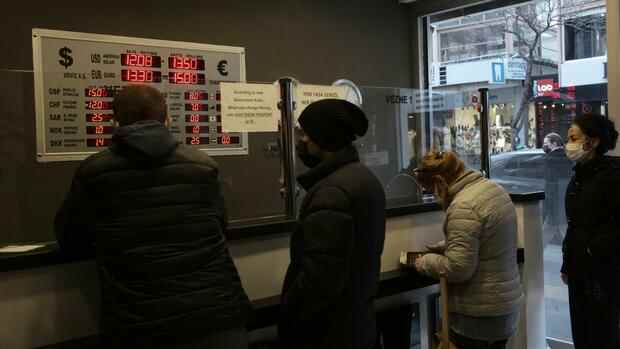Istanbul If the price of a packet of pasta in Germany tripled within a year, there would probably be protests. In Turkey this has become a reality. 500 grams of pasta from Barilla now cost 9.90 lira even at discounters – a year ago the value was 3.50 lira.
Not only noodles have become drastically more expensive, as the latest figures show. In Turkey, consumer prices have risen to a 19-year high. According to the national statistics institute Turkstat, they rose by 11.1 percent in January alone.
Annual inflation, which was 36.08 percent in December, is now at 48.69 percent. Food prices rose by 55 percent over the year, and energy prices rose by over 48 percent.
Annual so-called core inflation, which excludes volatile goods such as energy, food, tobacco and gold, also rose to a record 39.45 percent. Producer prices rose 10.45 percent monthly while the annual figure rose to 93.53 percent.
Top jobs of the day
Find the best jobs now and
be notified by email.
The Turkish lira reacted with a brief loss against the euro and dollar shortly after the figures were announced, but immediately made up for these losses. One euro currently costs 15.31 lira and one US dollar 13.56 lira. The leading Turkish index Bist100 increased slightly by 0.4 percent.
“If things continue like this, we’ll have to raise salaries”
Turkey is the undisputed leader when it comes to inflation, while world prices are rising. Turkey’s central bank governor Nureddin Nebati told the Japanese news agency Nikkei that inflation is likely to rise even further.
“In April inflation will peak,” he said. However, Nebati was convinced that she would not exceed 50 percent by then. However, this value was almost reached in January, as the investment company Oyak also notes. “We expect over 50 percent in February,” says an analysis on Thursday morning (local time).
We only increased the salaries of our employees at the turn of the year. If this continues, we’ll have to do it again soon. A German manager in Turkey
This is particularly tragic for Turkish consumers, but also for European buyers of Turkish industrial exports and German companies that produce in Turkey. They have to be prepared for price increases and wage increases, which in turn could further fuel inflation in Europe.
“We only increased our employees’ salaries at the turn of the year,” the managing director of a German production facility reported to the Handelsblatt shortly after the figures were announced. “If things continue like this, we’ll have to do it again soon.”
The independent Turkish organization Enag even comes up with an inflation rate of 114 percent. How this value is calculated is unknown and may depend on the preferences of individual consumers. But one thing is clear: the prices keep going up.
>> Read here: Inflation in the euro area rises to a record high – investors are betting on a rate hike
In the euro zone, the inflation rate rose to 5.1 percent in January – also a record high. In Germany, supermarket chains are trying to put pressure on their suppliers to prevent them from raising their prices. In Estonia and Lithuania, prices have even risen by around twelve percent, while the European Central Bank has so far stubbornly stuck to its zero interest rate policy and billion-dollar bond purchases.
In Turkey, the key interest rate of 14 percent is also well below the inflation rate. President Recep Tayyip Erdogan doesn’t want to change anything, but rather rebuild the Turkish economic model.
With low key interest rates and a weak currency, he wants to boost credit growth, a popular tool for ailing economies. As a result, the number of unemployed falls, but at the same time prices rise.
The weak currency, in turn, should ensure that exports abroad become cheaper and imports more expensive: Foreign companies and consumers should buy more Turkish products, while domestic people buy less abroad and demand more domestic products and services.
Erdogan’s strategy works only partially
In fact, Turkish companies exported 17 percent more in January than in the same month last year, a record value. However, imports have increased by 55 percent, mainly in the face of higher energy prices.
The Turkish electronics manufacturer Arcelik, for example, presented record figures for the fourth quarter of 2021 last week. Accordingly, sales increased by 69 percent within one year, the gross margin was 28 percent. For the current year, the company expects a further 60 percent growth.
Contrary to expectations, the financial sector is also benefiting from Ankara’s economic policy. Turkey’s Garanti Bank increased its net profit by 258 percent in the fourth quarter compared to the same period last year. Between October and the New Year alone, revenue from fees rose by 27 percent. The Turkish lira lost 47 percent in value over the same period.
But Erdogan’s strategy is only partially successful. For example, companies that have to buy preliminary products or raw materials from abroad for production are less fortunate. “Some import prices have doubled within a year,” says the German manager.
More: This is what matters at the ECB meeting
